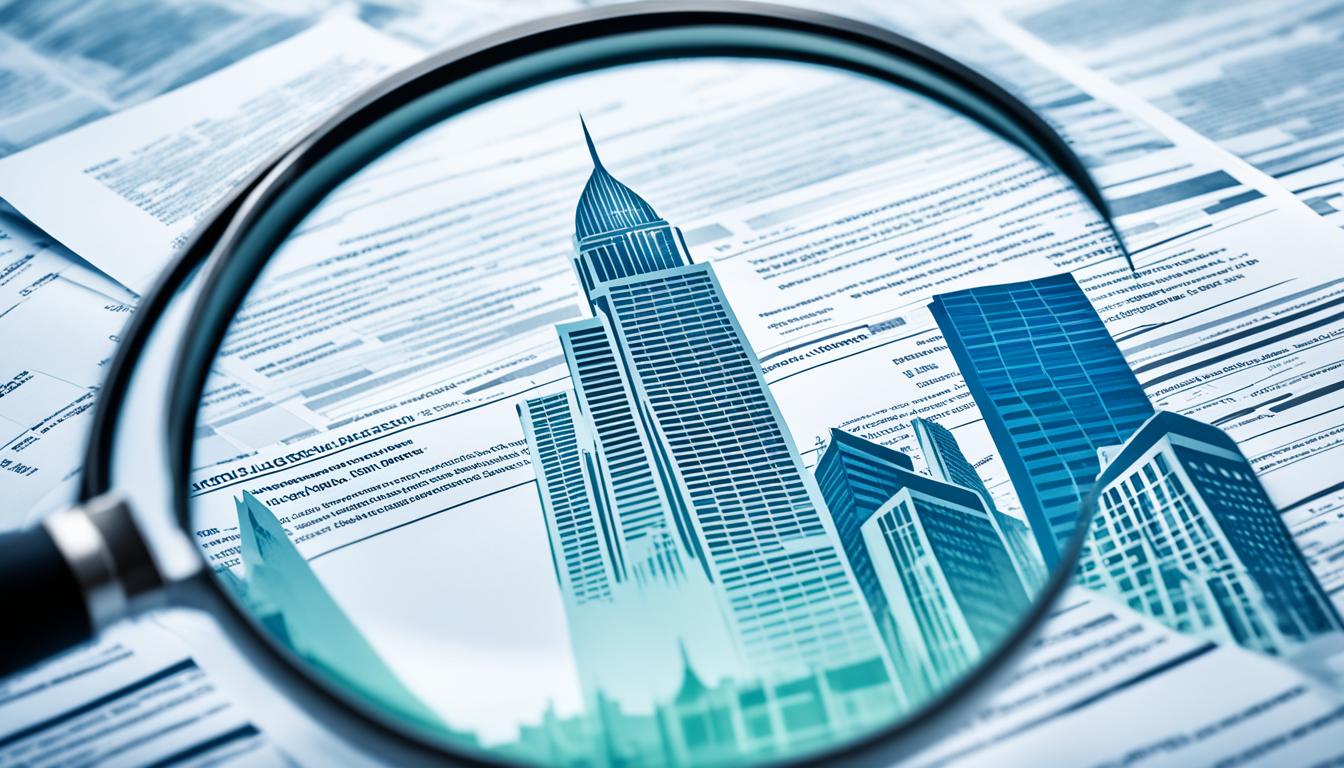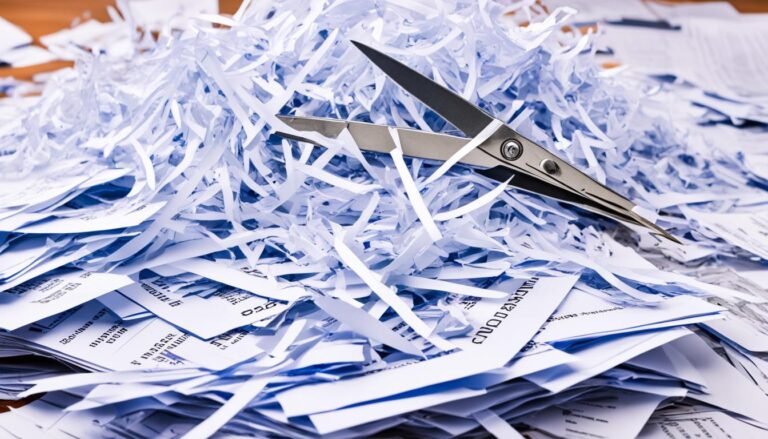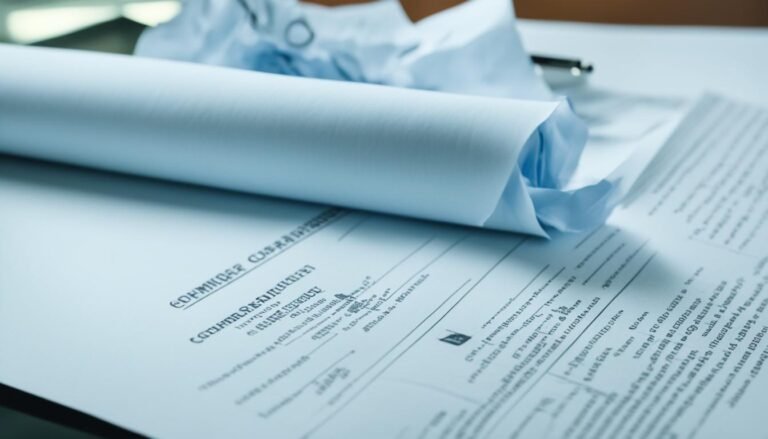Commercial Real Estate Law Basics for Small Business
Small businesses make up nearly 100% of all U.S. businesses. This shows their huge economic impact. If you’re a small business owner, knowing commercial real estate law basics is key to your success.
Commercial real estate law covers leasing rules and property laws. It’s important for managing commercial properties. You need to understand leasing agreements and legal requirements. This knowledge protects your business and keeps it running smoothly.
This article will explain the core concepts of commercial real estate law for small businesses. You’ll learn how to research and negotiate leases. These skills will help you make smart choices and protect your business’s interests.
Key Takeaways:
- Small businesses represent almost all U.S. businesses.
- Knowing about commercial real estate law is vital for small business owners.
- This law covers legal requirements, leasing rules, and property laws.
- Doing thorough research is crucial before signing a lease.
- It’s important to get good lease terms and know about extra costs and duties in the agreement.
Understanding Commercial Leasing
Commercial leasing is key for entrepreneurs in the world of business. It’s different from renting a home. These leases are longer and cover special business needs and costs.
Knowing about commercial leases helps small business owners. It guides them in handling real estate laws. This means they can negotiate leases well and keep things fair.
Entrepreneurs must choose their lease wisely. They should check all the details before they sign. Looking at the money they have to pay and how long the lease lasts is important.
Commercial leasing’s legal side can be tricky. Knowing the lease well protects your business interests.
Getting the commercial real estate contract right is crucial too. It details who has to do what in the building. This includes how long the lease lasts, who pays for what, and what you can and can’t do with the property.
Remember, each commercial lease is different. They all have their own special rules for that business and location. It’s important to read and tweak these terms to match your business’s needs.
How to Understand Commercial Leases:
- Thoroughly review the lease agreement to understand its terms and conditions.
- Seek legal advice to clarify any ambiguous clauses or terms.
- Negotiate terms that align with your business goals and financial capabilities.
- Pay attention to clauses related to maintenance responsibilities, utilities, and property modifications.
Knowing commercial leasing rules helps business owners. It lets them make smart choices. By understanding the law, they look after their business and help it grow.
Importance of Legal Compliance
For small businesses in commercial real estate, following the law is crucial. Owners must make sure their activities and property uses are legal. Not doing so can lead to fines, penalties, and even lawsuits.
It’s important to know and follow zoning laws. These laws say how land can be used, like for business or homes. Business owners need to match their activities with these rules.
Environmental laws are also key. Businesses must know about and follow laws for their industry or property. This includes handling waste, controlling pollution, and meeting environmental standards.
“Legal compliance is not just about avoiding penalties; it’s about establishing a solid foundation for your business.”
Fulfilling legal duties is about more than just avoiding trouble. It helps businesses earn customers’ trust and get along well with the community. This builds a strong future for their business.
Why Legal Compliance Matters
Following the law in commercial real estate does a lot of good:
- It lowers the chance of legal fights. Knowing and obeying the law means less trouble with the landlord, neighbors, or the authorities. This keeps a business’s reputation good and avoids costly legal fights.
- It keeps the business running. Breaking laws can force a business to close. Following the law keeps business owners earning and ensures their business stays open.
- It helps keep money in the business. Not following laws can cost a lot, from fines to fixing problems. By focusing on legal rules, business owners avoid extra costs and keep their business strong.
The Consequences of Non-Compliance
Not following the law in commercial real estate can lead to big problems, such as:
- Getting fined: Not complying often means getting financial penalties. These fines can vary but are always a burden for small businesses.
- Getting into legal trouble: Not following the law can start legal fights. These can be costly, time-consuming, and bad for a business’s image.
- Hurting the business’s reputation: Not staying legal can make the public lose trust in the business. This can lead to fewer sales and a bad brand image.
- Changing how the business runs: Not obeying the law may require fast changes. These sudden changes can cause problems for the business’s everyday work.
To keep a business legally sound, owners should get advice from property law experts. Addressing legal issues from the start helps protect the business. It keeps the focus on growth and success.
Key Components of a Commercial Lease Agreement
A commercial lease agreement is a deal between a landlord and a business tenant. It outlines the lease’s terms, making sure both sides know what to do. It’s important to look at the main parts of this agreement:
1. Names of the Parties
Make sure the agreement clearly states the names of the landlord and tenant. This binds the correct people to the deal.
2. Property Description
The lease should describe the property accurately to avoid confusion. It must include the address and details of the rented space.
3. Lease Duration
The lease must mention when it starts and ends. This is crucial for planning and understanding the lease’s timeframe.
4. Rent Payment Terms
The agreement outlines how rent is paid, like how often, how much, and how to pay it. It’s key to know your financial duties in the lease.
5. Additional Costs and Responsibilities
Extra costs, like taxes, maintenance, or utilities, could be the tenant’s responsibility. These should be clear in the agreement to avoid surprises.
6. Renewal and Termination Clauses
It must cover how the lease can end or continue. This includes how much notice is needed and the terms for staying or leaving.
7. Insurance and Liability
Insurance and who’s responsible for accidents should be in the lease. This is to make sure both parties know how to handle unexpected situations.
8. Maintenance and Repairs
It should say who is responsible for keeping up the property and fixing things. This ensures the place is well looked after.
9. Default and Remedies
The agreement lists what happens if someone doesn’t follow the rules and how to fix it. It clarifies what can be done about broken agreements.
10. Governing Law
Lastly, the lease should mention which laws apply. This sets where any legal issues will be handled.
A good commercial lease states these points clearly. It makes sure both sides are happy and the deal is fair and solid.
Conducting Research before Signing a Lease
Small business owners need to do their homework before signing a lease. They should research the landlord, the building owner, and the property’s zoning laws. This ensures they make smart choices and protect their business interests.
Vetting the landlord is key. They need to check on the landlord’s reputation, how they treat past tenants, and if they handle maintenance requests quickly. This info is crucial to see if the landlord is someone they can rely on and work well with.
Looking into the building owner is just as important. It’s wise to find out about the owner’s financial status, how they manage properties, and any legal issues they’re facing. Such knowledge sheds light on the owner’s dependability and the property’s overall state.
Knowing the property’s zoning laws helps figure out if it’s a good spot for the business. Small owners should look up the local zoning rules to confirm their business fits what’s allowed. This step prevents legal troubles and ensures the business runs smoothly in that location.
It doesn’t stop with checking the landlord and building owner or zoning laws. Owners should also learn about the area’s people and potential customers. Understanding who lives or works near the location can help decide if it’s a good fit to grow and succeed.
Being fully prepared makes small business owners feel more secure about lease agreements. It gives them the confidence that they’ve made well-informed choices and safeguarded their concerns.
| Key Steps for Researching Commercial Leases |
|---|
| Vet the landlord |
| Research the building owner |
| Understand zoning laws |
| Analyze area demographics |
Understanding Lease Terms and Payment Structure
Small business owners must focus on the lease terms and payment details when they sign a commercial lease. It’s vital for them to know the financial requirements and commitments. This knowledge help businesses plan their budgets well.
Lease Terms
The lease terms include how long the lease is and what rules you must follow. Make sure to review this part carefully. Understand the timeline and know any rules that could impact your business.
Rent Structure
The rent structure reveals how the rent is set and if it will go up over time. It’s key for small business owners to check this part. They need to make sure the rent fits their budget. Also, find out about penalties for late rent or if you end the lease early.
Payment Terms
The payment terms detail how you should pay rent and other costs. Knowing how to pay and when is very important. Small business owners must also check for any extra fees. These might include costs for common areas or utilities.
“Understanding the lease terms and payment structure is essential to avoid any surprises and maintain a healthy financial standing throughout the lease period. It is advisable to consult with a legal professional to ensure a thorough comprehension of the terms presented.”
Small business owners should always carefully look at the lease terms and payments structure. This helps them enter leases with confidence. Having clear information allows businesses to run smoothly in their new location. It aids in their growth and success.
Additional Costs and Responsibilities
Small business owners should think about more than just the rent in a commercial lease. They need to be ready for the additional costs and responsibilities. These can really change the total price of using a commercial space. Don’t forget to think about these during lease talks.
Property taxes are often part of a tenant’s expenses. This can sometimes be passed on from the landlord. Business owners must carefully check the lease to see how much they have to pay in property taxes.
Maintenance costs can also add up. Tenants often have to pay for keeping the place up. This includes fixing things, cleaning, and general maintenance. It’s wise to remember these costs when planning how much you’ll spend on the lease.
Don’t forget about building insurance. While the building is usually insured by the landlord, tenants may need their own insurance. This covers them in case of legal claims from their business activities.
And, tenants could be asked to pay for utilities too. This might include water, electricity, and gas. Make sure you know which utilities are included in the rent.
Understanding and Negotiating Additional Costs
It’s crucial for business owners to carefully go over the lease. They must understand the additional costs and responsibilities. If something seems unclear or unfair, seeking legal advice or talking with the landlord for a better deal is smart.
“Small business owners need to know all about the extra costs in a lease. It’s not only about the rent. It’s crucial to carefully read the lease and clear up anything uncertain about added costs with the landlord. Good communication is essential for an agreement that works for both parties.”
Truly understanding the extra costs and responsibilities is key for budgeting. It helps small business owners make smart choices about leasing. Knowing all the costs upfront can avoid surprises and keep finances stable over time.
Example Table – Additional Costs and Responsibilities
| Additional Cost | Description |
|---|---|
| Property Taxes | Taxes on the leased property imposed by the local government. |
| Maintenance Costs | Expenses associated with repairs, cleaning, and general upkeep of the premises. |
| Building Insurance | Insurance coverage for the commercial building, including liability protection. |
| Utilities | Costs for water, electricity, gas, and other essential services used by the tenant. |
Knowing the details of the extra costs in a lease is really important for small business owners. By being fully informed, they can budget better. This ensures a more worry-free and financially sound lease.
Nuisance Clauses and Exclusive Use
In commercial leases, you often find nuisance clauses. These are there to stop certain things that might annoy or disrupt others on the property. They usually say don’t make too much noise or weird smells, or use things that bother others. Small business owners need to check these out. Knowing what they can’t do is key. This helps run their business without getting into trouble.
Exclusive use contracts are great for businesses that need to stand out. With these contracts, a business gets to be the only one selling certain things in an area. This means no one else in the building can sell the same stuff. It helps these businesses keep more customers and be known in that area.
When thinking about these contracts, business owners should weigh the good and bad. Thinking about how this will affect plans to grow is important. Make sure the contract fits your business’s goals by discussing it well.
Negotiating Nuisance Clauses
Looking at a lease carefully, business owners should focus on the nuisance clauses. Sometimes, these rules can be changed to fit your business better while still being fair to others.
It’s key to get fair rules on noise, smells, and equipment. This helps businesses do their work without upsetting others on the property. It’s about finding a good balance.
“Nuisance clauses help keep everyone happy. But, it’s okay to ask to change them so you can run your business well.”
Benefits of Exclusive Use Contracts
Exclusive contracts are a big deal for competitive businesses like stores or restaurants. They let a business sell something unique in an area where no one else can. This is how they stand out and keep customers who like what they offer.
With this kind of contract, businesses feel safe putting lots of work into their brand and making customer experiences special. These deals make them special in the eyes of customers looking for something new.
| Advantages of Exclusive Use Contracts | Disadvantages of Exclusive Use Contracts |
|---|---|
|
|
Business owners, think carefully about exclusive use contracts. Think about how good they could be for your business. Getting advice from a lawyer helps make sure these deals are fair and good for your plans.
Importance of Due Diligence
Before small business owners sign a commercial lease, it’s crucial that they do their homework. This ensures they look after their interests and have a trouble-free time in their new location. It means taking the time to research thoroughly and grasp all the lease’s important points.
Knowing about the landlord is a key part of this process. It means finding out about their trustworthiness, history with past tenants, and any warning signs. This insight can guide owners in judging if the landlord is dependable and truly cares about the property.
It’s also very important to understand how lease transfers work, especially for businesses that might want to move or share the space later on. Grasping the conditions around transferring a lease is essential to dodge surprises or difficulties in the future.
Looking into local regulations on nuisances and the environment is a must. This helps ensure a business follows the law and checks for any risks involved. It’s about knowing the rules on things like noise levels, garbage disposal, and environmental conditions. This knowledge aids in making sure the leased space fits the business’ needs.
“Thorough due diligence helps mitigate risks and ensures that the business can operate smoothly within the leased space.”
Through thorough due diligence, business owners ensure they’re making a smart choice when signing a commercial lease. It involves getting to know the terms of the lease, their obligations, and if the space suits their business. With careful research and attention to detail, entrepreneurs can safeguard their interests and lay a strong foundation for their business.
Understanding Commercial Lease Statutes
Small business owners need to know about commercial lease laws. This knowledge helps protect their rights and make smart choices about leasing. These laws guide both landlords and tenants, making sure their dealings are fair.
The rent structure is a key part of these laws. They explain how rent is calculated and when it’s due. This includes any future changes. Knowing this helps businesses plan their budgets better.
Lease transfer rules are also important. If a business wants to move or sell, they must understand how they can pass the lease to someone else. The process and any risks involved are clearly stated in the statutes.
Important Lease Considerations
There are many more things these laws cover. For instance, they spell out who pays for what when it comes to running the property. This includes taxes, insurance, and upkeep.
They also explain what happens if the space needs fixing. They clarify who is in charge of what to keep the place in good shape. Knowing this prevents disagreements.
Having rules for how shared spaces are used stops arguments between tenants. These laws make sure everyone gets a fair chance to use these areas.
It’s crucial to understand when and how a lease can end or continue. These laws set out the steps and rules for these situations. This helps businesses plan for their future space needs.
Knowing these lease laws is vital for small business owners. It protects their business and helps them get better lease deals. It also keeps them out of legal trouble.
Next, we’ll share some tips on how to get a good commercial lease deal. Stay tuned for valuable advice.
Tips for a Successful Commercial Lease Agreement
Getting a commercial lease is key for small business owners. These tips will help you make the best of your lease:
1. Understand the Local Area
Before you lease, study the local area. Check how much traffic it gets, the nearby shops, and who lives around there. Knowing these details will show if the spot fits your business and clients.
2. Thoroughly Research the Landlord and Building Owner
It’s key to look into the landlord and owner’s background. Find out how they treat other business renters, if they fix issues quickly, and if there are any legal problems with the property. This check can help you trust the people managing the property.
3. Familiarize Oneself with Zoning Laws
Knowing the local business zoning laws is important. Make sure your business type is allowed in that area. Also, look into any rules that might limit what you can do.
4. Negotiate Terms that Align with Business Needs
Don’t be afraid to talk about the lease terms. Think about the rent, how long the lease will last, if you can extend it, and who pays for what. Getting the right terms can help your business do well.
5. Seek Legal Advice
It’s wise to get a commercial real estate lawyer. They can look over the agreement, give you advice, and make sure the contract is fair to you. A legal expert will help you through the tricky parts and avoid any bad surprises.
Note: A visually appealing image that enhances the section’s content, illustrating different aspects of a successful commercial lease agreement.
Using these tips and doing your homework can lead to a great commercial lease. It can help your business reach its long-term dreams.
Conclusion
For small businesses, understanding commercial real estate law is crucial. It includes knowing the leasing rules and compliance with the law. Also, key parts of a commercial lease are important to grasp. Doing your homework, checking everything, and negotiating well are critical. These steps ensure a good commercial lease deal for a small business.
Learning about commercial real estate law helps small business owners stay out of trouble. They need to know about the lease period, costs, and their responsibilities. Following local laws and eco-rules is a must to avoid problems and fines.
When signing a lease, small business owners must be careful. They should look into everything, from the landlord to the lease conditions. It’s also essential to think about extra costs and what you’re agreeing to. Getting good terms, like specific rules for annoying actions (nuisance clauses), is key to keeping your business safe in the property market.
Above all, small business owners need a solid grip on commercial real estate law. Focusing on following the rules, staying within the law, and negotiating hard is the smart way to get a lease that helps their business thrive.
FAQ
Q: What is commercial real estate law and why is it important for small businesses?
A: Commercial real estate law covers leasing, property laws, and legal compliance that small businesses should know. It’s really important for small business owners to get these basics right. This helps them follow laws and look out for their own benefits.
Q: What should small business owners know about commercial leasing?
A: Business owners should learn about commercial leasing rules. This includes special clauses about what a business can and cannot do with the space. Knowing this stuff is key to making sure the lease fits the business’s needs.
Q: Why is legal compliance important in commercial real estate for small businesses?
A: Keeping within the law is crucial for small business success. This includes following zoning rules and protecting the environment. Not following the law could lead to big fines or legal troubles.
Q: What are the key components of a commercial lease agreement?
A: A lease has who’s in it, the place’s info, how long, how much to pay, and any extra costs. Understanding these parts is vital before signing any papers.
Q: What research should small business owners conduct before signing a lease?
A: Checking out the landlord and zoning laws helps a lot. They should also look into who owns the building. It’s also good to see if the location fits the business’s goals.
Q: What should small business owners understand about lease terms and payment structure?
A: Owners must know the lease details like time, rent, and changes in costs over time. This understanding is critical for planning and managing their money well.
Q: Are there additional costs and responsibilities in commercial leases?
A: Yes, leases can include taxes, insurance, repairs, and utilities. It’s crucial for owners to check if these extra costs are manageable.
Q: What are nuisance clauses and exclusive use contracts in commercial leases?
A: Nuisance clauses limit loud noises or strong smells. They’re crucial for businesses to not disturb others. Exclusive use contracts can give a business special rights in a market or area.
Q: Why is due diligence important before signing a commercial lease?
A: Due diligence means checking out everything about the lease and location. It helps avoid problems and keeps things running smoothly.
Q: What lease considerations should small business owners be aware of?
A: It’s important to know about leasing rules and options. This knowledge helps owners protect their business. Understanding these laws is key for making smart rental choices.
Q: What tips can help small business owners secure a successful commercial lease agreement?
A: Understanding the area, the landlord, and the zoning laws is crucial. Also, negotiate a lease that suits the business. Doing these things can help the business grow and do well.
Q: Why should small business owners understand commercial real estate law basics?
A: Knowing about leasing and legal issues safeguards a business’s interests. It helps in making smart decisions. Good research and negotiation lead to beneficial lease deals.







